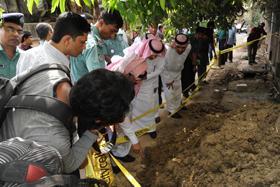THE killing of a Saudi diplomat at Gulshan early Tuesday is more than a poignant pointer to dismal law and order situation in the capital Dhaka as elsewhere in the country; it has put Bangladesh in delicate position as regards its relations with Saudi Arabia. According to a report front-paged in New Age, Khalaf bin Mohammed Salem Ali, head of citizen affairs at the Saudi embassy in Dhaka, was found shot in his chest a few yards away from his residence at about 12:50am, rushed to a city hospital at about 1:15am and was declared dead at about 5:15am. The operation officer of the Gulshan police station quoted the security guard of the nearby Portuguese consulate as saying that ‘he heard a gunshot at around 1:00am Tuesday and immediately saw a white car speed away.’ The incident provides a chilling reminder of the dismal state of law and order. After all, the killing took place in a locality which is just a stone’s throw away from the diplomatic enclave where security is supposed to remain heightened round the clock, round the year.
Most importantly, the killing of the Saudi diplomat could have serious ramification with Bangladesh’s relations with Saudi Arabia, which has been strained for different reasons in recent times. Suffice it to say, manpower export to Saudi Arabia has already marked a significant decline and the global financial crisis and economic recession may not have been the only reason contributing to the decline. Bangladesh certainly cannot afford a further dip in manpower export to Saudi Arabia and thus in remittance earning — which, along with earnings from apparel export, props the economy — given the fact that all other economic indicators have not been quite auspicious in recent times. While, according to the Bangladesh ambassador in Riyadh, the Saudi deputy minister for protocol has assured the Bangladesh government that the incident would have no impact on the relations between the two countries, such assurance appears predicated on how Riyadh perceives Dhaka’s response to its request for a ‘full investigation’ into the killing, in the days to come.
As such, there is hardly any room for the technicalities as to whether Khalaf was a ‘diplomat’, as claimed by the Saudi embassy in Dhaka, or a ‘non-diplomatic staff’, according to the foreign ministry records. Just as the foreign ministry director said in an official statement Tuesday evening, ‘regardless of the status of Mr Ali’, the government needs to be ‘determined to bring the perpetrators of the killing at the earliest.’ The investigators, meanwhile, need to keep in mind that the killing may have regional and international dimension to it. It is a standard practice in murder investigation to determine the motive, i.e. who stands to benefit most from it. If the killing were to further strain Dhaka-Riyadh relations and result in Saudi Arabia suspending recruitment of Bangladeshi workers, India and Pakistan would surely be benefited. The investigators need to take this aspect into account.
Overall, there is also very little margin for error in the investigation and the case needs to be resolved — the sooner the better — because it is not just a question of ensuring justice but also protecting the already wobbly economy from yet more blows.
